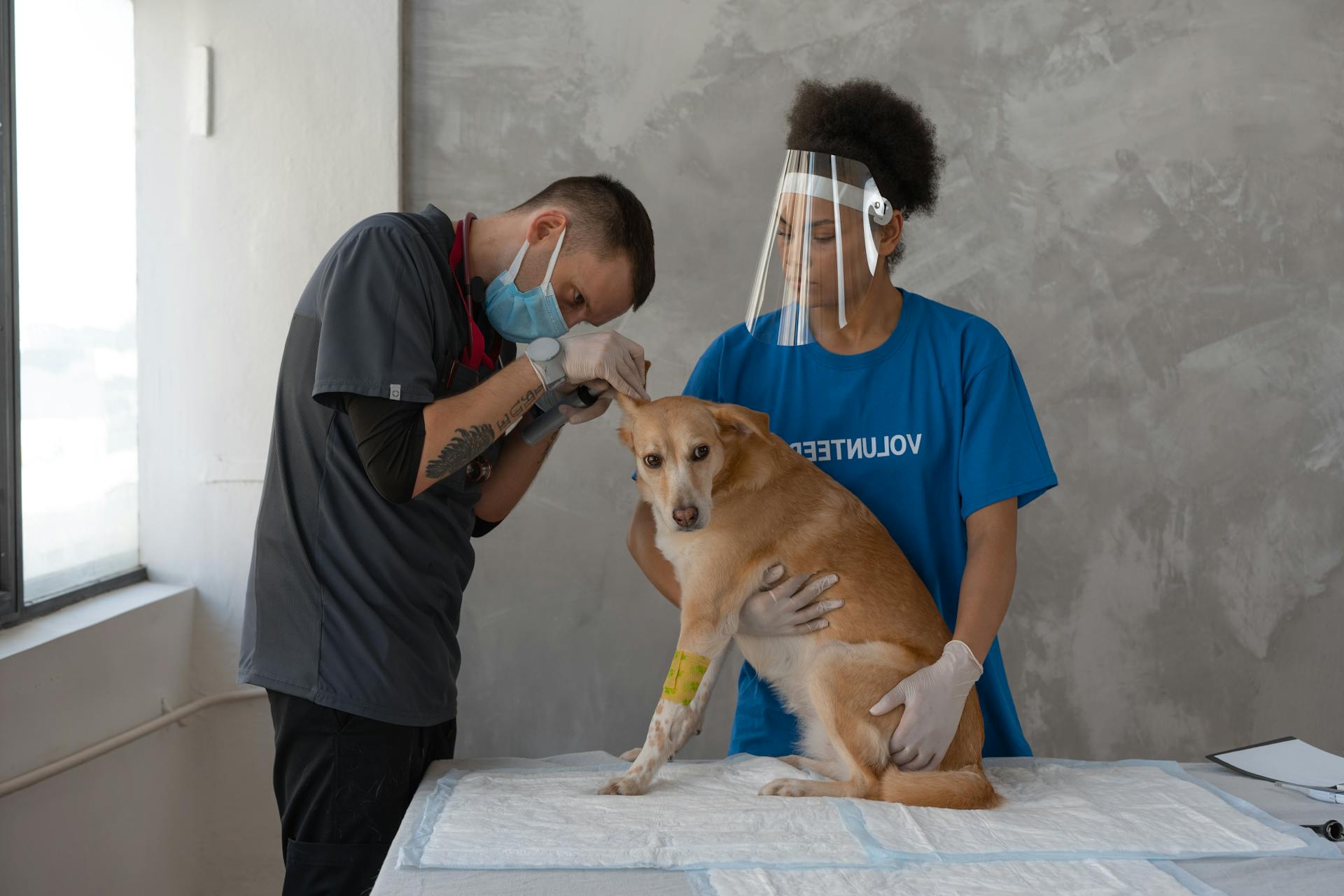
Older dogs can indeed get kennel cough, a contagious respiratory infection caused by the Bordetella bronchiseptica bacteria. It's more common in dogs that haven't been vaccinated or are immunocompromised.
The symptoms of kennel cough in older dogs are similar to those in younger dogs, but they can be more severe due to age-related health issues. Older dogs may experience a persistent cough, difficulty breathing, and a decrease in appetite.
As older dogs age, their immune systems weaken, making them more susceptible to infections like kennel cough. This is especially true for dogs over 7 years old, who may require booster shots to maintain their immunity.
Older dogs may also have underlying health conditions that can make kennel cough more challenging to treat.
What is Kennel Cough
Kennel cough is a highly contagious respiratory infection that affects dogs. It's caused by a virus or bacteria, and can be spread through the air when an infected dog coughs or sneezes.
The symptoms of kennel cough are unmistakable - a persistent, hacking cough that can last for weeks. Dogs may also show signs of a runny nose, sneezing, and loss of appetite.
Kennel cough is not just a minor annoyance, it can lead to more serious complications like pneumonia or bronchitis. In severe cases, it can even be life-threatening.
Causes and Transmission
Older dogs can get kennel cough from a variety of airborne bacteria and viruses, including Bordetella bronchiseptica and canine parainfluenza.
These pathogens are often spread through close contact with other dogs, such as at dog parks, dog shows, or boarding kennels.
Dogs can also catch kennel cough by breathing in cough or sneeze droplets from infected dogs, or by exposure to contaminated items like toys, bedding, or water bowls.
The risk of infection is especially high when dogs are in close contact with other infected dogs for long periods of time.
Some of the CIRDC-associated bacteria and viruses can even infect and cause illness in cats.
Bordetella bronchiseptica, the bacterium that most commonly causes kennel cough, is highly contagious and can be spread through airborne droplets, direct contact, or contaminated surfaces.
Only one CIRDC-associated organism, Bordetella bronchiseptica, is known to infect people, and cases of dog-to-human transmission are extremely rare.
Diagnosis and Treatment
Diagnosis of kennel cough in older dogs is similar to that in younger dogs. Veterinarians diagnose kennel cough based on clinical signs, like coughing, and a history of recent exposure to other dogs.
There are no laboratory tests to specifically confirm kennel cough, but veterinarians may recommend additional tests such as blood work and chest x-rays to rule out other, more serious conditions.
Veterinarians may ask you questions like: Does your dog have trouble breathing between coughing fits? When do they do it? (At night? After eating? After drinking water? After exercise? When they are excited?) What does it sound like? (A goose? A seal?) Is the cough dry or moist? Does it sound like they are about to vomit?
If this caught your attention, see: Does Kennel Cough Get Worse before It Gets Better
Your vet will examine your dog and run tests to find out if the problem is due to a virus, an infection, an allergy, or a different problem.
The treatment for kennel cough in older dogs is similar to that in younger dogs. Most dogs recover from kennel cough on their own with mild supportive care, such as increasing humidity in their environment and using cough suppressants.
Antibiotics are usually not required for uncomplicated infections, but may be administered in complicated cases or if there are signs of bacterial pneumonia.
Here are some signs that your older dog needs to see the vet:
- Their cough lasts more than a week, or worsens.
- They seem extra tired.
- They have a fever.
- They won’t eat.
- They have other health problems.
Diagnosing
Diagnosing kennel cough in dogs involves a combination of clinical signs and a history of exposure to other dogs. Veterinarians look for symptoms like coughing, which is a key indicator of the condition.
A veterinarian will ask about your dog's recent interactions with other dogs to determine if they've been exposed to the virus. This is because kennel cough is highly contagious and often spreads through close contact with infected dogs.
There are no specific laboratory tests to confirm kennel cough, so veterinarians rely on clinical signs and a diagnosis based on symptoms and exposure history.
Treating
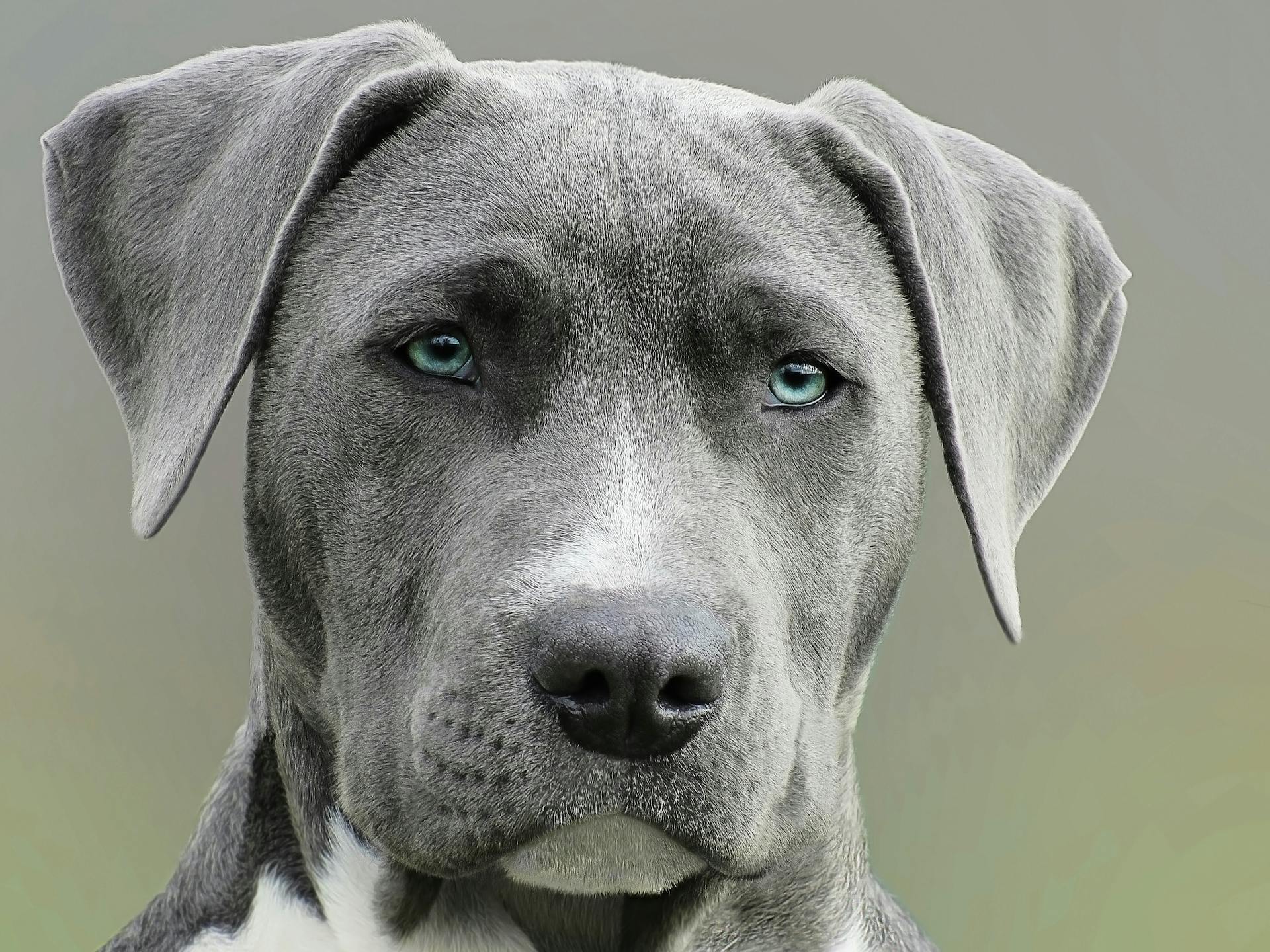
Treating kennel cough can be a straightforward process for uncomplicated cases. Most dogs recover on their own with mild supportive care.
Your veterinarian may recommend cough suppressants to help manage your dog's symptoms. They might also suggest increasing humidity in your dog's environment to help soothe their throat.
Antibiotics are usually not required for uncomplicated infections, but they can be necessary for more advanced cases of kennel cough. Dogs with pneumonia may require hospitalization in an isolation ward.
Complicated cases of kennel cough can get pricey, with costs varying depending on your individual veterinary care provider and location.
Here's a summary of the treatment options for kennel cough:
If your dog is suspected to have kennel cough, your veterinarian will likely prescribe an antibiotic to prevent secondary bacterial infection and a cough suppressant. It's essential to have a proper veterinary examination and diagnostics before starting any treatment.
Symptoms and Duration
Older dogs can get kennel cough, and it's essential to recognize the symptoms to get proper treatment. A strong, persistent cough is the most obvious symptom, often sounding like a "honking" sound.
The cough can be triggered by excitement, pressure on the neck, or other similar activity, which can be mistaken for something stuck in the dog's throat. You may also notice other signs, such as nasal discharge, fever, decreased appetite, lethargy, and difficulty breathing.
Some dogs may show other symptoms, including sneezing, a runny nose, or eye discharge. It's crucial to report any coughing symptom to your veterinarian, as it could be a sign of a more serious disease.
Here's a list of common symptoms of kennel cough in older dogs:
- Strong cough, often with a “honking” sound
- Runny nose
- Sneezing
- Lethargy
- Loss of appetite
- Low fever
If you suspect your older dog has kennel cough, isolate it from other dogs and call your veterinarian. They can typically diagnose kennel cough from a physical exam and history, but may want to perform diagnostic tests if your dog is depressed, feverish, or showing other concerning symptoms.
Signs and Symptoms
The primary sign of kennel cough is a dry-sounding, spasmodic cough caused by pathogens that induce inflammation of the trachea and bronchi. This cough can be triggered by excitement, pressure on the neck, or other similar activity.
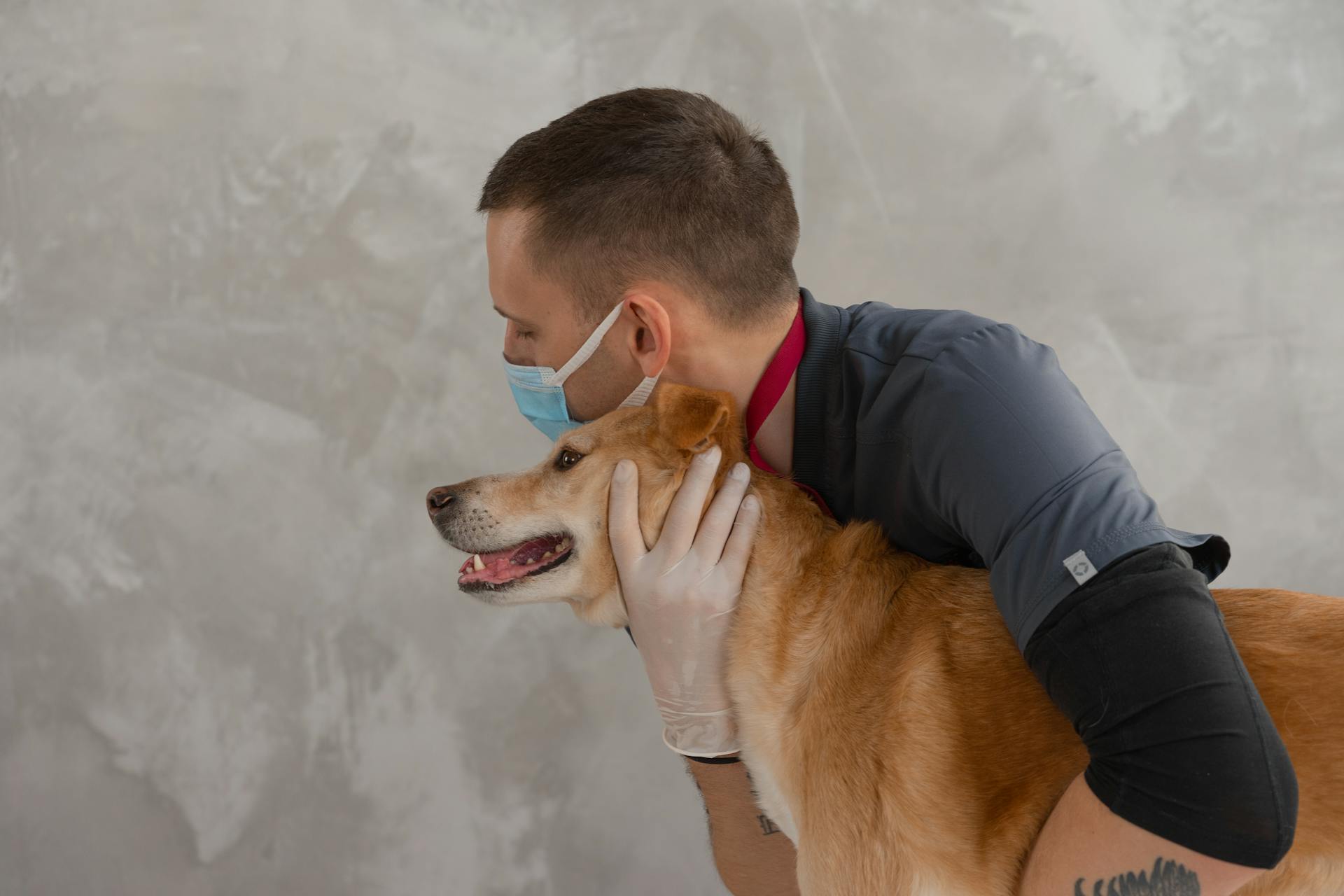
You may also notice your dog coughing up secretions or gagging on them, which can be mistaken for something stuck in their throat. The cough can be productive instead of dry.
Some dogs may develop other signs of illness, including nasal discharge, fever, decreased appetite, lethargy, and difficulty breathing. Runny nose, sneezing, and eye discharge can also be symptoms of kennel cough.
A strong cough, often with a "honking" sound, is the most obvious symptom of kennel cough. This cough can be persistent and forceful, and may be accompanied by a runny nose and sneezing.
Here are the common symptoms of kennel cough:
- Strong cough, often with a “honking” sound
- Runny nose
- Sneezing
- Lethargy
- Loss of appetite
- Low fever
It's worth noting that kennel cough can be easily treatable in healthy dogs, but it's essential to report any coughing symptom to your veterinarian, as it could be a sign of a more serious disease.
How Long Does It Last?
Most dogs with kennel cough recover completely within 1 to 3 weeks.

The recovery time can be longer for older dogs or those with other medical conditions, taking up to 6 weeks to fully recover.
If your dog doesn't improve within the expected amount of time, be sure to follow up with your veterinarian.
Rapid breathing, not eating, or listlessness in your dog can be signs of more serious conditions, and you should contact your vet right away.
How Long Is Contagious?
Dogs with kennel cough are contagious for 10-14 days, but antibiotics can shorten this window.
In most cases, a healthy adult dog will recover from kennel cough and no longer be contagious after two weeks.
Puppies younger than 6 months old or dogs with compromised immune systems may take longer to recover and could be contagious for a longer period.
Kennel cough is highly treatable, but it's essential to keep an eye on your dog's symptoms and follow the advice of a veterinarian to ensure they recover as quickly as possible.
Prevention and Management
To reduce your older dog's risk of contracting kennel cough, make sure the facilities they visit require vaccinations for all dogs, even if your dog is already vaccinated. This will further reduce the chances of your dog getting kennel cough.
You can also keep unvaccinated dogs away from crowded areas like dog parks, kennels, and doggie daycares, and away from dogs with known infections.
There are three forms of vaccine for kennel cough: injected, nasal mist, and oral. While these vaccines may help, they don't guarantee protection against kennel cough, as it can be caused by many different bacteria and viruses.
Here are some key points to consider when choosing a kennel cough vaccine for your older dog:
Keep in mind that no vaccine is 100% effective, and your older dog may still contract kennel cough even if vaccinated.
Prevention
Prevention is key when it comes to keeping your furry friend healthy. Vaccinations are a crucial part of prevention, but they're not foolproof. To reduce your dog's risk of contracting kennel cough, make sure the facilities they visit require vaccinations for all dogs, even if your dog is already vaccinated.
For more insights, see: Prevent Kennel Cough
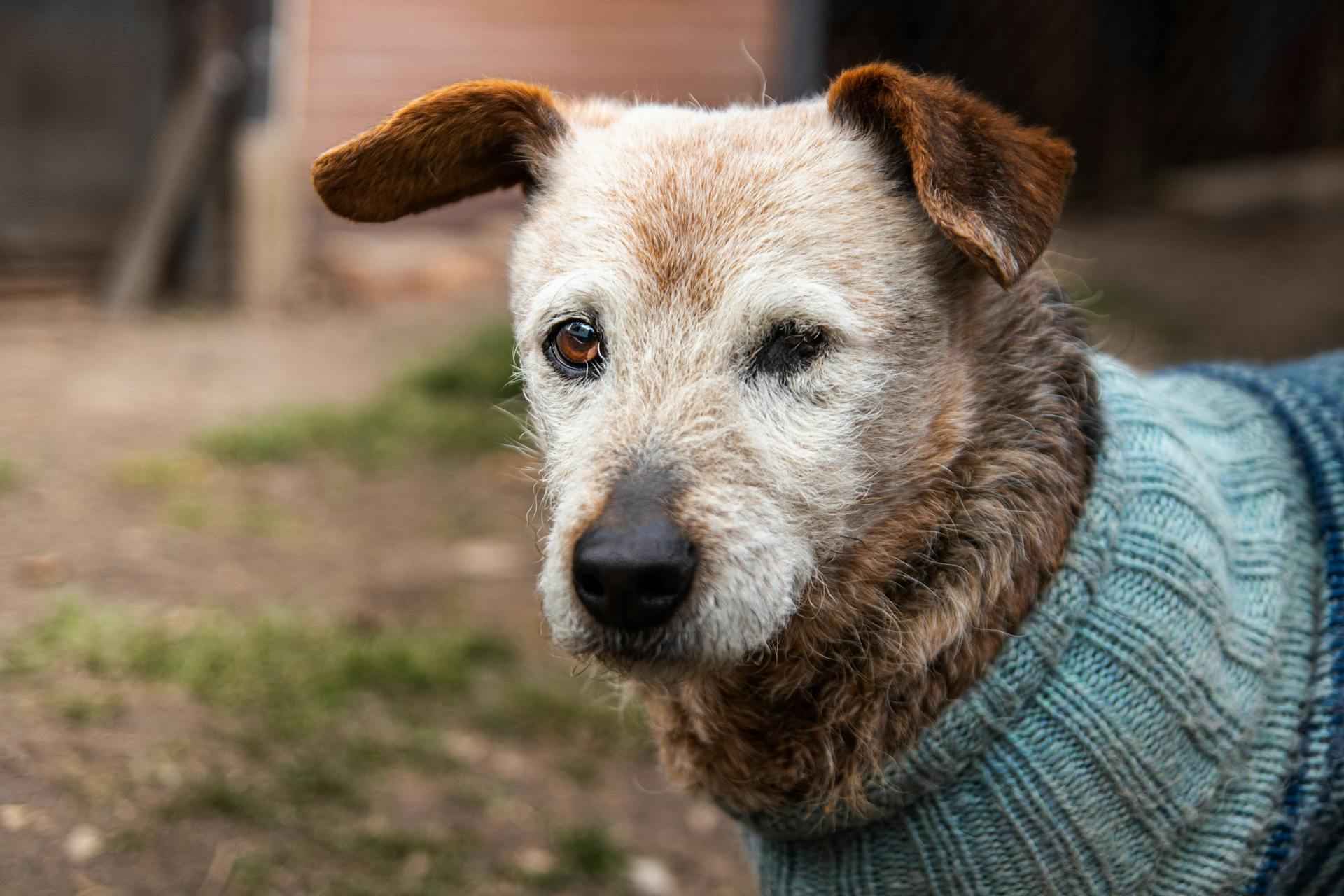
If you take your dog to a groomer, kennel, daycare, or obedience school, check if they have a vaccination policy in place. This will help minimize the chances of your dog getting kennel cough. Unvaccinated dogs should be kept away from areas where dogs congregate, like dog parks and dog daycare centers, and away from dogs with known infections.
There are three forms of vaccine for kennel cough: injected, nasal mist, and oral. None of these vaccines guarantee protection against kennel cough, as it can be caused by many different bacteria and viruses. The intranasal and oral vaccines are usually given once a year, but may be recommended every six months for high-risk dogs.
Dogs who are frequently boarded, visit dog daycare, or compete in canine sports may benefit from the kennel cough vaccine. Many facilities require proof of vaccination, so it's essential to check the requirements before taking your dog to a new place. The vaccine is available in various forms, including oral, intranasal, and injectable.
Here are some key facts about kennel cough vaccines:
- Oral, intranasal, and injectable forms are available.
- Typically given in two doses two to four weeks apart, followed by a booster every six months to a year.
- May not prevent kennel cough caused by other germs, like canine adenovirus type 2 or canine parainfluenza virus.
To keep your dog safe, keep their vaccines current. This will not only reduce the chance of illness but also make your dog less likely to develop severe disease or spread the infection to other dogs.
Recovery and Management
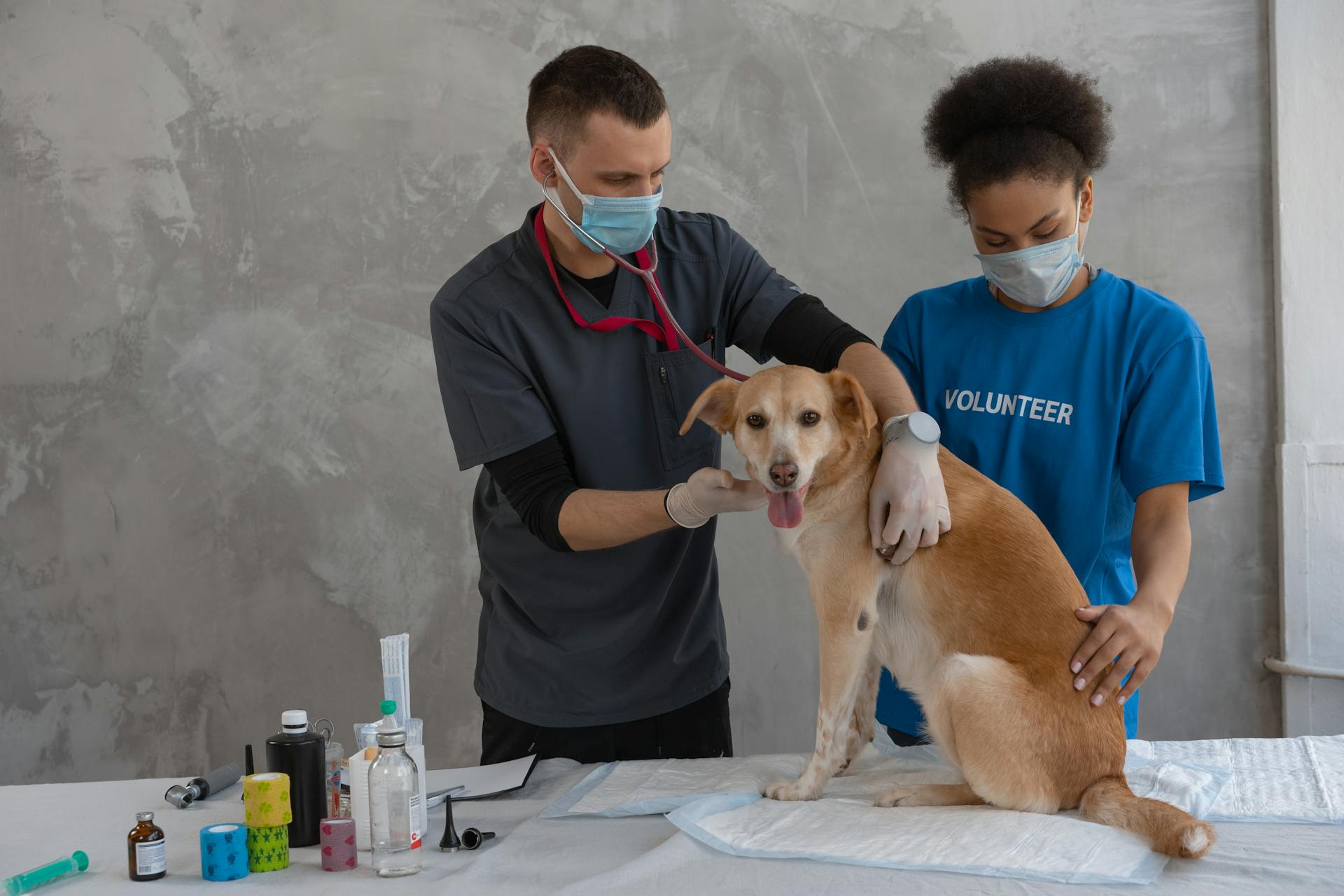
Isolating your dog from other dogs is crucial during recovery from kennel cough, especially around unvaccinated or immunocompromised dogs.
You can spread infection via your hands and clothing, so take care not to introduce pathogens accidentally.
Most dogs recover from kennel cough on their own within 10 to 20 days.
Reduce your dog's activities to avoid coughing episodes during this time.
Disinfect all items your dog is in regular contact with using a solution of bleach diluted in water (1:32).
Readers also liked: When Can a Female Dog Get Pregnant during Heat
Frequently Asked Questions
Can a 7 year old dog get kennel cough?
Yes, a 7-year-old dog can get kennel cough, although the risk is lower than for puppies and unvaccinated dogs. Kennel cough can affect dogs of any age, so it's essential to know the symptoms and take preventative measures.
Why is my dog coughing and gagging like he has a hairball?
Dogs coughing and gagging can be caused by various health issues, including respiratory infections, fungal infections, and more serious conditions like heart disease or lungworm. If you're concerned about your dog's symptoms, it's essential to consult a veterinarian for proper diagnosis and treatment
Sources
- https://www.smalldoorvet.com/learning-center/medical/kennel-cough/
- https://www.webmd.com/pets/dogs/kennel-cough-in-dogs
- https://www.avma.org/resources-tools/pet-owners/petcare/canine-infectious-respiratory-disease-complex-kennel-cough
- https://www.akc.org/expert-advice/health/kennel-cough-in-dogs/
- https://callananveterinarygroup.com/what-is-kennel-cough/
Featured Images: pexels.com


